The curse of Aliens in gaming, and how Aliens: Dark Descent can break it
Scott's riddle
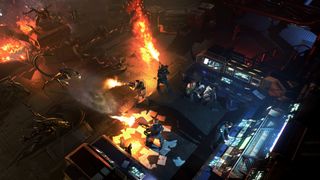
How many great Aliens games have you played? I’ll tell you how many I have: it’s two.
That’s not a great at-bat for video game titles carrying the movie franchise name. Because as far as I can count there have been as many Aliens games as there are molecules in the universe. It’s such a natural setting for a shooter, or a survival horror, or even a squad-based strategy – and yet almost no one has satisfied fans of both the movie universe and the gaming medium.
It’s Alien: Isolation and the 1999 version of Rebellion’s Aliens Vs. Predator, by the way; the latter of which now goes by the confusing moniker Aliens Vs. Predator Classic 2000 on Steam. Those are the two games I felt absolutely ‘got’ the licenses they held – leveraged them beautifully and conjured something like the same sickening atmosphere of Ridley Scott and Jimmy Cameron’s movies.
If I knew quite how they did it, I wouldn’t be sitting here writing this article like a schmuck – I’d be a creative director on an upcoming game like squad tactics title Aliens: Dark Descent. The game debuted at Summer Game Fest 2022, and faces the unenviable task of beating the odds and managing to be at least pretty good.
But I think it had something to do with the way both games broke down the visual language of the movie universe into component parts with such care and attention, so that they could build something new yet immediately recognisable and authentic – not just a tour ride through the movie’s scenes and props.
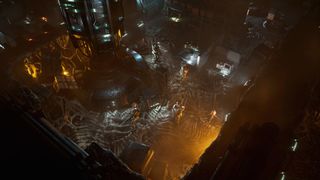
By contrast, Aliens: Fireteam Elite and – you knew it was going to come up – Aliens: Colonial Marines appear to take too many liberties with that visual language. Or perhaps they don’t quite sweat the details enough – the sense of scale is a bit off. The xenomorphs don’t dominate the corridors’ space like they should.
What Dark Descent absolutely must do, then, is smash down the 1986 movie into its smallest elements, from the typeface on the writing of its doors to the cut of Weyland-Yutani suit sleeves, and build its world from those pieces. We get that you know what a space marine helmet and a pulse rifle look like by now, developers. It doesn’t have the same impact when we see them anymore. We need to go deeper.
Get daily insight, inspiration and deals in your inbox
Get the hottest deals available in your inbox plus news, reviews, opinion, analysis and more from the TechRadar team.
Murder in motion
Xenomorph animation is the other massive pitfall in these licensed games. We so rarely see the whole alien onscreen in any of the movies, let alone all of it in motion. So whenever we see that in an Aliens shooter, it looks a bit wrong. The legs aren’t right. It’s moving too weightlessly, or with too human a walk, or something.
They didn’t hire a xenomorph to act in the movies. It’s a guy in a rubber suit
This is because, of course, they didn’t hire a xenomorph to act in the movies. It’s a guy in a rubber suit – an absurdly long-limbed Nigerian actor named Bolaji Badejo, in the 1979 movie’s case, or a partial animatronic model. Or a dog, in David Fincher’s Alien 3. Or a bit of dated CG, in subsequent movies’ examples. So we just don’t have a north star to aim at when it comes to xenomorphs moving correctly.
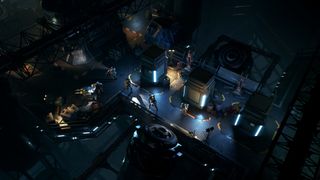
Alien: Isolation comes closest, to my eye. And I think that’s because it looks a bit like a really tall man in a suit. Your pursuer’s not doing anything humanly impossible with its spine, and that really lends to the eeriness. Of course, with only one xenomorph to render for the majority of the game, the studio could spend a lot of resources on both fidelity and animation.
Dark Descent doesn’t have that luxury. We’ve already seen from the trailer, and indeed inferred from the 1986 movie stylings, that there’ll be multiple xenomorphs attacking you at once. It’s got to find a way to make them move, in groups, in convincing fashion, from a very video game-y camera perspective.
Gory time
Next comes narrative. This isn’t usually the beating heart of Alien games, nor does it need to be. One might even argue that premise trumps plot in the movies themselves. The story of ‘a group of space truckers that respond to a distress beacon and discover a hostile unidentified lifeform’ is inherently more gripping than the where, why, who and how of them all getting picked off in Alien. But a strong setup and some good dialogue certainly helps.
This is where the aforementioned Aliens Vs. Predator must take a backseat for Alien: Isolation. The latter gives you enough premise to feel cut off and vulnerable and at the same time understand why your character’s so driven to continue, to survive. It’s not a great yarn, but nothing that happens, no line of dialogue, feels at odds with the cinematic universe.
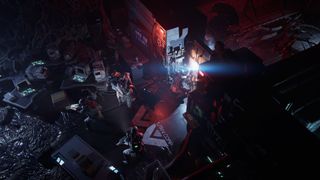
Time to reintroduce Colonial Marines as a counterpoint. The characterisation, plotting, and dialogue here really are Syfy channel caliber. It either genuinely mistakes complexity for quality or simply hopes you won’t follow closely enough to notice its nonsense. Even worse than the animations, the downgrade, and all the rest, was the way its tone of voice ran roughshod over the movies.
Given Dark Descent’s genre, it’s not going to live or die on its story. But it did demonstrate some decent characterisation within a short cinematic trailer at Summer Game Fest. Not especially in the gruff, seen-it-all space marine, but in the moment of double-crossing between colleagues.
Playing with your trust has always been a big part of this license. Company men, synthetics – sorry, artificial humans – prisoners, clones… they’re all there to make you feel unsafe in the company of people as well as monsters. We’ve recently seen how well a strategy game can use a handful of key characters throughout a campaign, in Warhammer 40K: Chaos Gate – Daemonhunters. If Dark Descent can summon something similar it’ll have a leg-up on most of its ancestors.
Perfect organism
We’re probably perfectionists about Aliens games, at the root of it. The universe seems so complete in the best movies, so walk-in, and so ripe for further examination, that it’s incredibly frustrating to find ourselves in something that doesn’t feel connected to them. Or that doesn’t seem to understand why we found them fascinating in the first place. But like developers themselves, we’re probably too focused on whether it’s a good Aliens game, rather than whether it’s a good shooter, or survival horror, or strategy experience.
AvP is a fantastic shooter. Really. The alien’s acid blood feels like a perfect mechanic for an FPS when you’re in it, as does the horrible scuttling speed and insta-death of the facehugger. The Predators weapons feel as though they were retrofitted into the movies from Rebellion’s game, not vice versa. And Alien: Isolation is, above all, a great horror game. I mean, it’s absolutely horrible, and miserable, and unbearable. But on purpose.
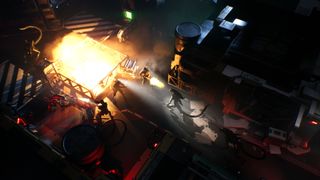
It wouldn’t matter how much they looked, sounded, or smelled like Aliens movies if they weren’t doing something enjoyable and coherent within their genre. So obviously the strategic elements of Dark Descent need to work better than anything else in the game. The license could feel like an afterthought if it’s a satisfying enough tactical experience.
I hope that helps, devs. Let me know if you need a creative director on the next one, yeah?

Ad creative by day, wandering mystic of 90s gaming folklore by moonlight, freelance contributor Phil started writing about games during the late Byzantine Empire era. Since then he’s picked up bylines for The Guardian, Rolling Stone, IGN, USA Today, Eurogamer, PC Gamer, VG247, Edge, Gazetta Dello Sport, Computerbild, Rock Paper Shotgun, Official PlayStation Magazine, Official Xbox Magaine, CVG, Games Master, TrustedReviews, Green Man Gaming, and a few others but he doesn’t want to bore you with too many. Won a GMA once.
Most Popular

